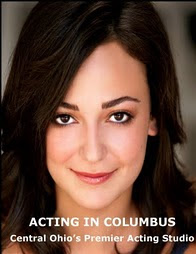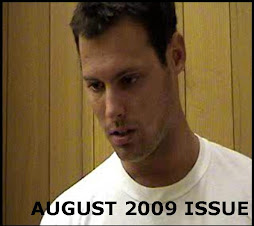CRAFT NOTES by ED HOOKS
“Advanced Pretend”
Jeff Bridges was recently being interviewed on The Charlie Rose Show in connection with his latest film Crazy Heart when the conversation turned to his opinion about the art and craft of acting. “Basically,” he explained with a grin, “acting is advanced pretend.” I really like that description because it is so uncomplicated and is correct. There is a library full of books and DVDs that will tell you how tough it is to be an actor. A newcomer takes a look at the list of techniques to be mastered, including sense memory, emotional recall, substitution, staying in the moment, voice projection, diction, repetition exercises, active listening, how not to indicate, and on and on. First thing you know, acting is not so much fun any more. It is not at all like it was in the high school production where everybody just had a good time. Now you have to “do the work” and “prepare the instrument." When you didn’t know much about it, you simply jumped into the pool and splashed around. Now you dare not get wet until you are absolutely certain that you can do five laps with alternating strokes.
When my daughter, Dagny, was five or six years old, she would occasionally see me on television. If my role called for violence or tears, the performance was disturbing to her. I remember explaining to her that I was pretending, that nobody really hit me, and that I was actually having a good time when I cried. She thought about that for a very long moment. In her 5-year-old mind, pretending was what she and her friends did when trying on clothes and shoes from her mom’s closet. Pretending was what she did when she played tea-time and served her doll a cookie. She therefore concluded that there must be a distinction between her kind of pretend and the kind of pretend I was doing on television. “So that is not pretend-pretend? It is for-real pretend?” Exactly, it is for-real pretend. Or, as Jeff Bridges put it, “advanced pretend.”
Fade Out/Fade In, Present-day Ed Hooks acting class: A new student enrolls, an attractive woman in her early thirties who has been chasing an acting career for twelve years. I can tell when she walks into the studio that she is gut-level unhappy and frustrated but that, by God, she is ready to work. She is determined to lick this career monster yet! I sit her down and ask when was the last time she had fun acting, and she doesn’t have an answer. She wants to tell me about her Meisner training or whatever. I ask her why she came into acting in the first place, and she has to reach far back into her memory before replying. “I don’t know. I was maybe nineteen when I started….” “Was it fun back then?” She smiles, “Yes, it was.” I tell her that she must recapture that feeling of pretend, of playing. She has enough technique already. What she is lacking is perspective, confidence and optimism. I tell her that, for the first couple of months in my workshop, I want her to simply get up on stage and make mistakes and learn how to laugh at her silly self. “Acting is not neat and pretty,” I explain. “You are never ever going to get it ‘right’. It is all pure process. And part of that process is the audience recognizing that you are having fun being on stage.”
Jeff Bridges was recently being interviewed on The Charlie Rose Show in connection with his latest film Crazy Heart when the conversation turned to his opinion about the art and craft of acting. “Basically,” he explained with a grin, “acting is advanced pretend.” I really like that description because it is so uncomplicated and is correct. There is a library full of books and DVDs that will tell you how tough it is to be an actor. A newcomer takes a look at the list of techniques to be mastered, including sense memory, emotional recall, substitution, staying in the moment, voice projection, diction, repetition exercises, active listening, how not to indicate, and on and on. First thing you know, acting is not so much fun any more. It is not at all like it was in the high school production where everybody just had a good time. Now you have to “do the work” and “prepare the instrument." When you didn’t know much about it, you simply jumped into the pool and splashed around. Now you dare not get wet until you are absolutely certain that you can do five laps with alternating strokes.
When my daughter, Dagny, was five or six years old, she would occasionally see me on television. If my role called for violence or tears, the performance was disturbing to her. I remember explaining to her that I was pretending, that nobody really hit me, and that I was actually having a good time when I cried. She thought about that for a very long moment. In her 5-year-old mind, pretending was what she and her friends did when trying on clothes and shoes from her mom’s closet. Pretending was what she did when she played tea-time and served her doll a cookie. She therefore concluded that there must be a distinction between her kind of pretend and the kind of pretend I was doing on television. “So that is not pretend-pretend? It is for-real pretend?” Exactly, it is for-real pretend. Or, as Jeff Bridges put it, “advanced pretend.”
Fade Out/Fade In, Present-day Ed Hooks acting class: A new student enrolls, an attractive woman in her early thirties who has been chasing an acting career for twelve years. I can tell when she walks into the studio that she is gut-level unhappy and frustrated but that, by God, she is ready to work. She is determined to lick this career monster yet! I sit her down and ask when was the last time she had fun acting, and she doesn’t have an answer. She wants to tell me about her Meisner training or whatever. I ask her why she came into acting in the first place, and she has to reach far back into her memory before replying. “I don’t know. I was maybe nineteen when I started….” “Was it fun back then?” She smiles, “Yes, it was.” I tell her that she must recapture that feeling of pretend, of playing. She has enough technique already. What she is lacking is perspective, confidence and optimism. I tell her that, for the first couple of months in my workshop, I want her to simply get up on stage and make mistakes and learn how to laugh at her silly self. “Acting is not neat and pretty,” I explain. “You are never ever going to get it ‘right’. It is all pure process. And part of that process is the audience recognizing that you are having fun being on stage.”




















